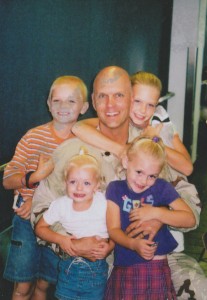Families in the Air Force lead a distinct family life. The image of a family member coming home in a box is a daunting one, but these families have an unbreakable bond because of it.

Colonel Paul M. Kucharek has been in military service for almost 27 years. He has traveled to different countries and experienced many cultures and is now colonel for BYU’s Air Force ROTC, or Detachment 855. Kucharek believes the Air Force is a great opportunity for people to give back and have something to be motivated about every day, but it’s no walk in the park.
“On one hand, I can’t wait to go to work,” Kucharek said. “On the other, I’ll be away from my family for a long time.”
Staying close as a family is a priority for Kucharek. “I always try to involve the kids and make it fun for them when I’m around,” he said.
The time commitment is extensive, the work is hard, and the career is violent. But the Air Force has an effective support system that helps everyone stay together, wherever they are—the Spouses and Sweethearts Club.
Each Air Force detachment runs its own support club. The leader who manages the events is generally the spouse of the wing commander. The spouses of the family take care of each other while their significant others are deployed. The club is a strictly social club, giving everyone some downtime away from Air Force-related thoughts.
According to Kucharek, the Spouses and Sweethearts Club supports families through babysitting, free oil changes and anything else they can offer to support each other. Kucharek’s wife, Karen, has been in charge of the club before and would do anything she could to help. “Getting involved in service helps you forget trials,” Kucharek said.
Karen Kucharek and their six children hold down the fort at home while Paul Kucharek is away. On one particular deployment she counted 32 people who preformed random acts of service, including a woman from the ward appearing at their home and taking the children to Chuck E. Cheese for the day.
“The most difficult thing for me is having him gone,” she explained. “What helps the most is the really good support system from the neighbors, friends and church.”
People often have a hard time admitting when they need an extra hand. Kucharek explained that the best way to help is to just show up and do it and to understand the power of a verbal thank you. “We’re off doing things; we get the pay raise and the promotion while they’re keeping things together at home. A lot of the thanks I get should go to my family,” Paul Kucharek said.
Although some might suppose that the military life would hinder a family’s relationship, Karen Kucharek believes it has had a positive effect on her kids and family. She explained that her kids are more “resistant” and that they’re not “entitled.” More than anything. they’ve learned that they can “go through hard things and Heavenly Father will provide.”
Current Wing Commander Jonathan Hedger is in the Air Force and wants to be a fighter pilot, a vision he didn’t always have. After looking into the ROTC at BYU, he joined the Army but quickly switched to the Air Force when he found his passion for flying.
Hedger and his wife, Megan, have one boy, and he’s part of Jonathan Hedger’s motivation. But the wing commander knows there is no career without his family. “Your family has to be pulled together; it’s all you’ve got. We’ve accepted a life of constant change, but we’ll make it,” he said.
According to Jonathan Hedger, the Northwest Region commander visited BYU’s Air Force ROTC recently. During the visit he explained that during the span of his whole career, his wife was the only person who had veto power, because it wasn’t just his career, but their career. Jonathan Hedger now follows this same principle, saying that it’s something he and his wife “decided to do together” and that it’s “our career, not mine.”
Previous Wing Commander Jesse Lanham has been passionate about airplanes since his early years. When he got home from his mission, he kept feeling that the military lifestyle would be too hard. But as he considered the options, everything fell into place.
Lanham and his wife, Alysha, grew up on the same street and have always been close to home.
“I worry about her, because it’ll be hard for her when there are no families to go to on Sundays,” Jesse Lanham said. “There will be a season of adjustment that will be kind of tough, but in the end it will bring us close together.”
Both Jonathan Hedger and Jesse Lanham don’t fully understand what the commitment entails but are prepared for the commitment they’ve made. “People’s lives are literally in your hands. You have a great influence for good, and it’s more than just doing the 8–5 thing,” Jonathan Hedger said.
The duty is daily and a large commitment, but the rewards pay off. With such important missions to accomplish, the Air Force is heavily relied upon — a blanket of security for the entire country.
“Everyone has to come to terms and try to internalize what we’re doing,” Jesse Lanham said. “It’s going to be a lifestyle, one of sacrifice, but it’s about moving forward with faith.”




